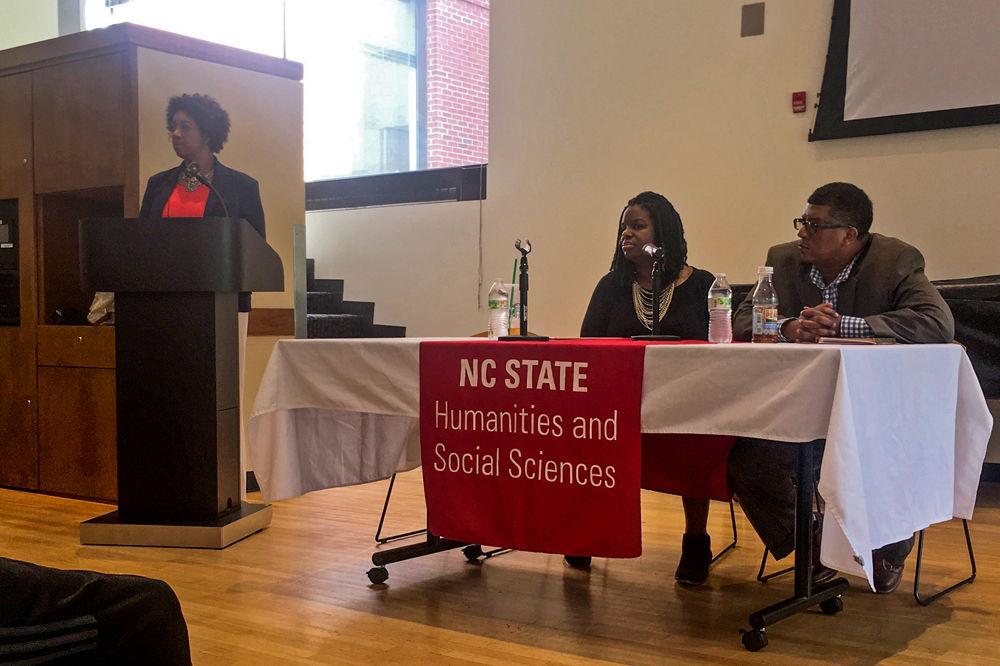A Black Lives Matter town hall featuring NC State professors Blair Kelley and Stephen Ferguson as panelists was held on Tuesday, Oct. 16 discussing the impact of social media on the movement and the ways all students can engage in societal issues.
The town hall was hosted as a part of Diversity Education Week (DEW) on campus by the College of Humanities and Social Sciences (CHASS).
Kelley, associate professor of history and assistant dean for interdisciplinary studies and international programs in CHASS, emphasized that engaging students in these discussions helps to connect the campus community with larger societal issues.
“I think it’s incredibly important to have conversations that connect the outside political world of ideas with the lived experiences of our students and folks on campus,” Kelley said regarding the town hall. “I think it’s hard to do because I think campuses are microcosms all on their own, and they have their own sets of questions and challenges that aren’t necessarily always in conversations with the outside world.”
As an event part of DEW, the town hall was meant to promote the ideals of the week, which included increasing diversity awareness, challenging social issues and encouraging students to engage in inclusion efforts throughout the year outside of a classroom setting.
“This is an opportunity for students to take what they learn in the classroom beyond that,” said Ferguson, a professor of philosophy and religious studies and Africana studies. “To kind of get out of your comfort zone in terms of what you think of as the universal experience of the Wolfpack. I think it’s important for all of us to engage with all of the different segments that make up the Wolfpack. I think that’s incredibly important.”
The town hall, moderated by Director of Multicultural Student Affairs Nashia Whittenburg, allowed for students, faculty and staff to ask Kelley and Ferguson about issues around the Black Lives Matter movement and the racial climate at NC State. Over 50 individuals attended the event in the Caldwell Lounge.
“I was glad to see a good turnout of students milling in and out, really overhearing our conversation and wanting to be a part of it,” Kelley said.
During the town hall, Ferguson addressed that Black Lives Matter is not only a slogan, but also meant to represent a national movement.
“Black Lives Matter represents both a slogan and a social movement,” Ferguson said during the town hall. “As a slogan, I think we’ll find the Black Lives Matter will last as long as black power and the black power fist and a host of other iconic images that we associate with the black freedom movement.”
Kelley, who went viral on Twitter for a thread of tweets calling out Kanye West’s racist comments about slavery in May, said that for her, Twitter allowed her to see the growth of the Black Lives Matter movement. She explained how social media can be a platform to engage in conversations about racial issues on a larger scale and to a diverse demographic.
“I know a lot of people are very critical of Twitter and social media and its problems and its shortcomings, but for me, what I saw was the ability of everyday people of your generation to make a difference,” Kelley said during the town hall. “It meant that young people could speak for themselves and say how they were experiencing the world without filter.”
Ferguson also mentioned that while NC State is making strides, like renaming the University College Commons building after the first African-American to receive an undergraduate degree, there are still challenges that black students on campus face, like the reported decline in enrollment of black students from nine to six percent from 2006 to 2016.
“The duality of a campus like this. On the one hand, we have something great by recognizing the legacy of Irwin Holmes and renaming a building after him,” Ferguson said during the town hall. “But we’re also looking at a decline in terms of student enrollment in the last 10 years, which is significant.”
Ferguson said that discussing Black Lives Matter and having students engage in conversations around racial issues will only improve the campus for everyone.
“The complexity here is getting people to understand that all of us have an investment in terms of making NC State a better campus. And at the core, whether that’s criticism or praise, it’s to make NC State a better campus,” Ferguson said.
More events and general information for Diversity Education Week can be found here.








